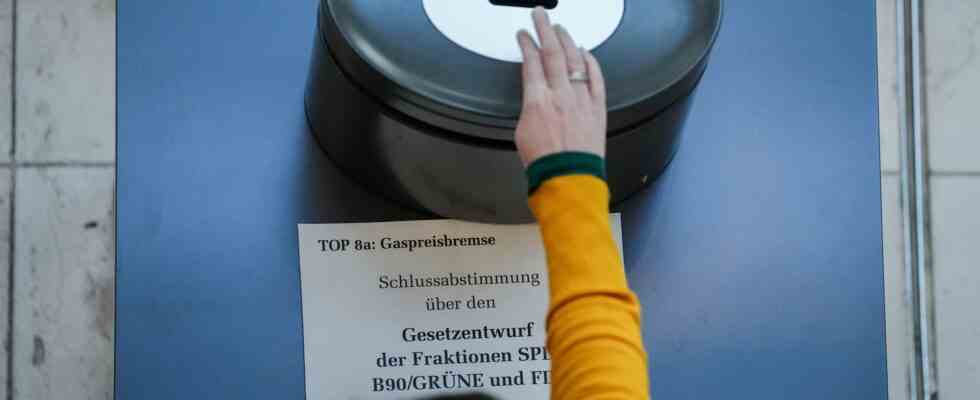Status: 12/15/2022 2:06 p.m
The Bundestag has approved the electricity and gas price brakes. They should take effect from March, but also apply retrospectively to January and February. For financing, high proceeds from energy producers are partially skimmed off.
The Bundestag has passed the multi-billion dollar package of laws to curb electricity and gas prices. From January, households and companies will be relieved in the energy crisis. In return, some of the currently high revenues from energy producers are skimmed off in order to help finance the aid.
After weeks of negotiations, the Bundestag decides on energy price brakes for 2023
Nicole Kohnert, ARD Berlin, daily news at 12:00 p.m., December 15, 2022
At the same time, renewable energies are to be promoted more strongly. The package of probably more than 100 billion euros was wrestled with until the very end within the traffic light coalition. In a roll-call vote, the plans of the traffic light coalition received a majority.
The key points at a glance:
Electricity and gas price caps
Electricity and gas prices are capped for basic consumption for households, trade and companies. Consumers will only feel this from March – albeit retrospectively from January – to April 2024. The following applies to households and businesses: 80 percent of the gas consumption of the previous year will be limited to twelve cents per kilowatt hour. For quantities in excess of this, the higher market price acts as an incentive to save. The cap for electricity is 40 cents.
For the approximately 25,000 large-scale consumers in industry, a price of seven cents for 70 percent of gas consumption and 13 cents for electricity will also apply from January. Further assistance applies to Deutsche Bahn and other train operators.
Bonus payments and dividends
Companies that benefit from the aid have to accept restrictions on bonus payments to managers and dividend payments to shareholders. From 25 million euros no new bonuses and bonus increases may be paid. From 50 million euros, no bonuses and no dividends may flow. This applies to the year 2023.
hardship rules
A fund for cases of hardship should also benefit users of oil and pellet heating systems under certain conditions. The aid should be up to 2000 euros. The federal government is providing a total of up to 1.8 billion euros for this.
Hospitals and care facilities are also to receive separate aid in view of the burden of energy prices.
Skimming off the proceeds from energy producers
Above all, electricity producers from renewable energies to nuclear power are to cede part of their currently high revenues. They benefit from the linking of the electricity price to the gas price and can thus make high profits, although they have hardly any higher generation costs.
Depending on the technology, they have to surrender 90 percent of their proceeds above a respective upper limit by April 2024. This should apply retrospectively from December. This helps to finance the electricity and gas price brakes.
Renewable energy
In view of the cost increases in the construction of wind and solar parks – for example due to sharply increased interest rates on loans – the subsidy should be increased. The projects are advertised by the state, and whoever asks for the lowest funding is awarded the contract.
Maximum bids apply for the required aid. These can now be increased by up to 25 percent. This is to ensure that all advertised projects are actually implemented.

